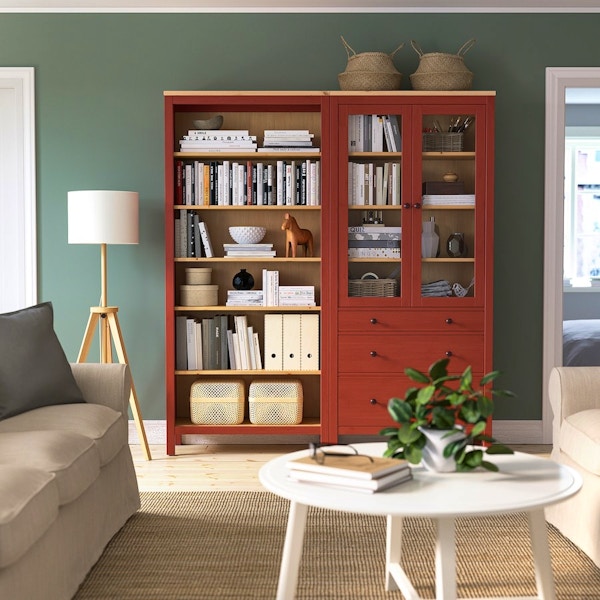Disruptors such as Habitat, IKEA, and Pooky are part of a vanguard that has redefined interiors, bringing both innovation and accessibility to the masses. From democratising design to pioneering sustainability, these brands have left an indelible mark on our homes and lives. Here's how these game-changers shifted Britain’s interiors landscape.
Habitat: The Pioneer of Contemporary Living

Founded in 1964 by Sir Terence Conran, Habitat – whose original shop was on the corner of Sloane Avenue and the Fulham Road – was the brand that first brought modern design to the mainstream British public. Before its advent, interiors were dominated by heavy, traditional styles that catered to more formal lifestyles.
Enter Habitat which changed the way we saw our homes thanks to Conran's vision to make stylish, modern furniture and accessories available at prices that young, urban dwellers could afford. The designs were minimal, functional, and contemporary – an antidote to the fussy, ornate furnishings of previous eras – plus, long before IKEA, Habitat introduced the concept of flat-packed furniture to the UK market, making it easier to transport and assemble larger pieces in urban homes with limited space.
Habitat was all about creating a lifestyle. The stores were carefully curated, with whole rooms set up to inspire customers on how to build cohesive, stylish interiors and making it possible for shoppers to envision how they might live.
We love: It may long ago have been sold by the Conran dynasty, but some of the design tenets remain at Habitat’s current incarnation. We like the Habitat Medium Carbon Steel Enamel Coated Roaster, £13, for its practicality, presentability and Gallic sensibility.
IKEA: Democratising Design On A Global Scale

No discussion of interior design disruptors is complete without mentioning IKEA, the Swedish behemoth that transformed the furniture industry globally. Founded in 1943 by Ingvar Kamprad, IKEA fundamentally changed how people furnished their homes by combining affordability, design, and convenience.
IKEA built on Habitat's idea of flat-packed furniture, bringing it to a whole new level as the core aspect of its business model. This innovation reduced transportation and storage costs – savings that were duly passed on to the customer. Flat-pack also fostered a DIY spirit that resonated with young, budget-conscious customers.
IKEA's mantra has always been to offer ‘affordable solutions for better living.’ Its products are designed with both form and function in mind, often inspired by Scandinavian minimalism. What’s more, in recent years, IKEA has led the charge towards sustainability, incorporating recycled materials into the designs, setting ambitious climate targets, and designing products meant to last or be recycled. Its commitment to environmental responsibility has thus made eco-conscious living more accessible to the everyday consumer.
We love: The elegant HEMNES Storage Combination W Doors/Drawers, Red Stained/Light Brown Stained, £498, which looks as though it could cost four times the amount.
Pooky: The Lighting Innovator

Pooky burst onto the scene in 2014 as a disruptor in the world of lighting. Founded by Rohan Blacker, the man also responsible for sofa.com, Pooky focuses on bringing beautiful, high-quality lighting into the mainstream – without the attendant designer price tag.
The real genius lies in the marriage of modernism with traditional softly pleated, printed or card shades that cast an invitingly warm glow. There had long been a plethora of expensive avant-garde lighting for those with deep pockets and the right sensibility. Where the market had lacked, however, was in the kinds of lamps that make life cosier – the sort that one hitherto saw dotted around stately homes and country house hotels, but rarely for sale at affordable prices.
Pooky seized the opportunity, offering lighting that blends traditional craftsmanship with modern designs at accessible price points. Their products – whether sculptural table lamps, cosy parchment shades or striking pendant lights – challenge the idea that beautiful lighting should be the preserve of the very wealthy.
We love: We are big fans of Pooky’s ikat shades, and adore the 40cm Straight Empire Shade, which would warm up any space at the flick of a switch,
Heal's: British Craft and Modern Design

With over 200 years of history, Heal’s is a quintessential British brand that has continually evolved to stay at the forefront of modern design. Founded in 1810, the brand started as a feather-dressing business but has transformed into a beacon of modernist interiors throughout the 20th-century, demonstrating the power of reinvention and keeping on top changing tastes and mores.
Whilst it may not be a champion of affordabilty in the same way as Habitat, Heal's nonetheless played a pivotal role in introducing modernist furniture to the UK during the early 20th-century. Collaborating with design titans such as Marcel Breuer and Mies van der Rohe, the brand brought cutting-edge designs to British homes, encouraging the shift away from heavy, traditional furniture to sleek, modern pieces.
To this day, Heal's remains synonymous with quality craftsmanship, merging traditional British woodworking skills with modern innovation. It has continually supported British craftsmanship, often sourcing its designs from local artisans and manufacturers. The brand’s reputation is built on the balance between artisanal techniques and contemporary design principles – a visit to its flagship store on Tottenham Court Road is always a masterclass in durable, timeless style.
We love: The Mathew Hilton-designed Balzac Armchair And Footstool, £6.290, which, for the 25 years since it launched, has put a contemporary spin on the club chair, becoming an icon in its own right.
Made.com: Digital-First Disruptor

While most interior disruptors were rooted in the physical retail space, Made.com turned the industry on its head by being one of the first digital-first furniture brands. Founded in 2010, Made.com capitalised on the shift towards online shopping and the growing appetite for affordable, high-quality design.
Made.com’s business model was based on cutting out the middleman and selling directly to consumers, reducing costs and allowing the company to offer designer-quality products at more affordable prices. One of its strokes of genius has been to engage its customers in the design process, with Made.com often crowdsourcing feedback on prototypes and allowing consumers to vote on which designs should go into production.
With no brick-and-mortar stores and minimal storage costs, Made.com has always been able to respond to design trends more efficiently. It also reduces waste by producing in smaller quantities based on consumer demand, cutting down on excess stock. Clever, no?
We love: The Harlow Bedframe, £799 – £999, whose style and comfort epitomises why we love Made.com so very much.




